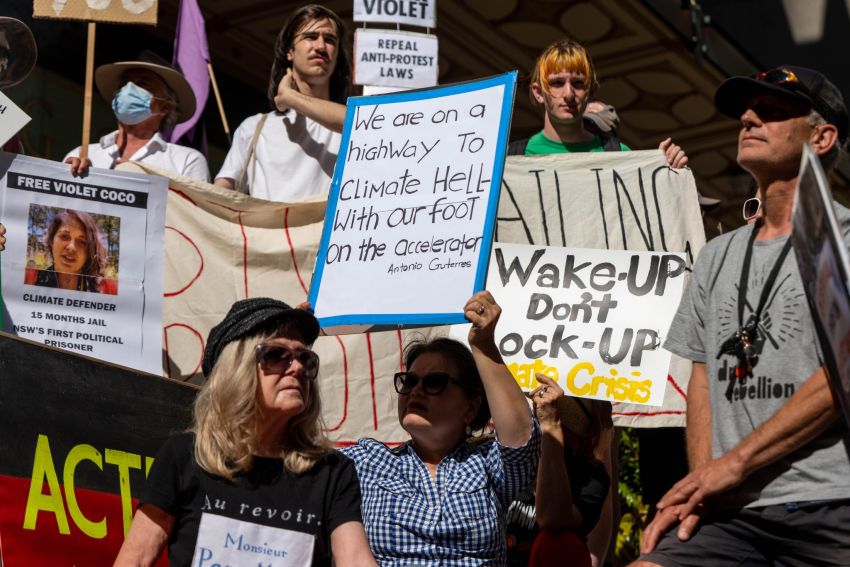
A local court magistrate handed down a prison sentence of unprecedented severity on December 2 to a non-violent protester, Violet CoCo, my friend and a leading figure in the climate movement.
Violet and I, along with Alan Glover and Karen Fitz-Gibbon, were involved in a protest on April 13, on behalf of climate-activist group Fireproof Australia.
We blocked a single lane of traffic on Sydney Harbour Bridge for less than 30 minutes.
Prior to sentencing, Violet had already spent three days in custody. After being released Violet spent a further 20 days under house arrest — confined to a small apartment — followed by 126 days under strict curfew.
Meanwhile, I spent four days in custody — including two days in Silverwater jail — followed by 42 days under house arrest, with police visiting my home up to three times a day.
Reviewing these bail conditions — as well as a three-month prison sentence handed down to another Fireproof Australia protester Andrew George — Human Rights Watch deemed them to be “politically motivated”, “disproportionate”, “vindictive”, and “in violation of [our] basic rights”.
When we were finally sentenced, while I narrowly avoided receiving a custodial sentence, Violet received a sentence of 15-months’ imprisonment.
Violet and I made a conscious decision to engage in civil disobedience which, by definition, involves breaking the law.
We were prepared to face the consequences of our actions.
But when a nonviolent protester, such as Violet, is given a sentence of 15 months, it would seem that something is deeply wrong with the justice system in this country.
Yet, from the perspective of those in power, this is the judicial system working exactly as intended.
It is protecting the right of those in extractive industries to continue to make obscene profits at the expense of a liveable planet.
These corporations are pouring money into the pockets of both the major parties so that, no matter who wins government, these companies can be sure the system will continue to work in their favour. And it does.
According to a recent analysis — the first long-term assessment of the oil and gas industry sector’s total profits in Australian dollars — it made a total of $76 trillion in “rents” since 1970. Rents designate excess returns after factoring in production costs.
That equates to more than $4 billion a day in pure, unearned profit.
Aviel Verbruggen, the author of that analysis, said: “You can buy every politician, every system with all this money. It protects [producers] from political interference that may limit their activities.”
On top of these profits, taxpayers in Australia are handing over more than $22,000 a minute in subsidies to these companies, while they destroy the world around us.
Protesters, such as Violet, contradict the politicians' narrative that the climate crisis is “under control” and that they are doing everything they can to solve the problem.
The fact is, the Labor government’s current target of a 43% reduction in emissions by 2030 is utterly incongruous with avoiding the most catastrophic consequences of global heating, to keep warming below 1.5°C.
In fact, a target of 43% by 2030 does not even align with limiting warming to 2°C. According to United Nations Secretary-General António Guterres, on the current trajectory we remain “on a highway to climate hell”.
We did not undertake our actions to be popular.
These were drastic — even desperate — actions. But these actions were proportional to the scale and extent of the crisis we are facing.
We are gathered here to demand a just outcome for Violet.
We demand an end to the criminalisation of protest. And we join Violet in demanding emergency action on the climate crisis.
[Jay Larbalestier is an activist in Fireproof Australia. This article is based on remarks were delivered to the solidarity rally for Violet CoCo on December 13 outside the Downing Street Centre Court.]